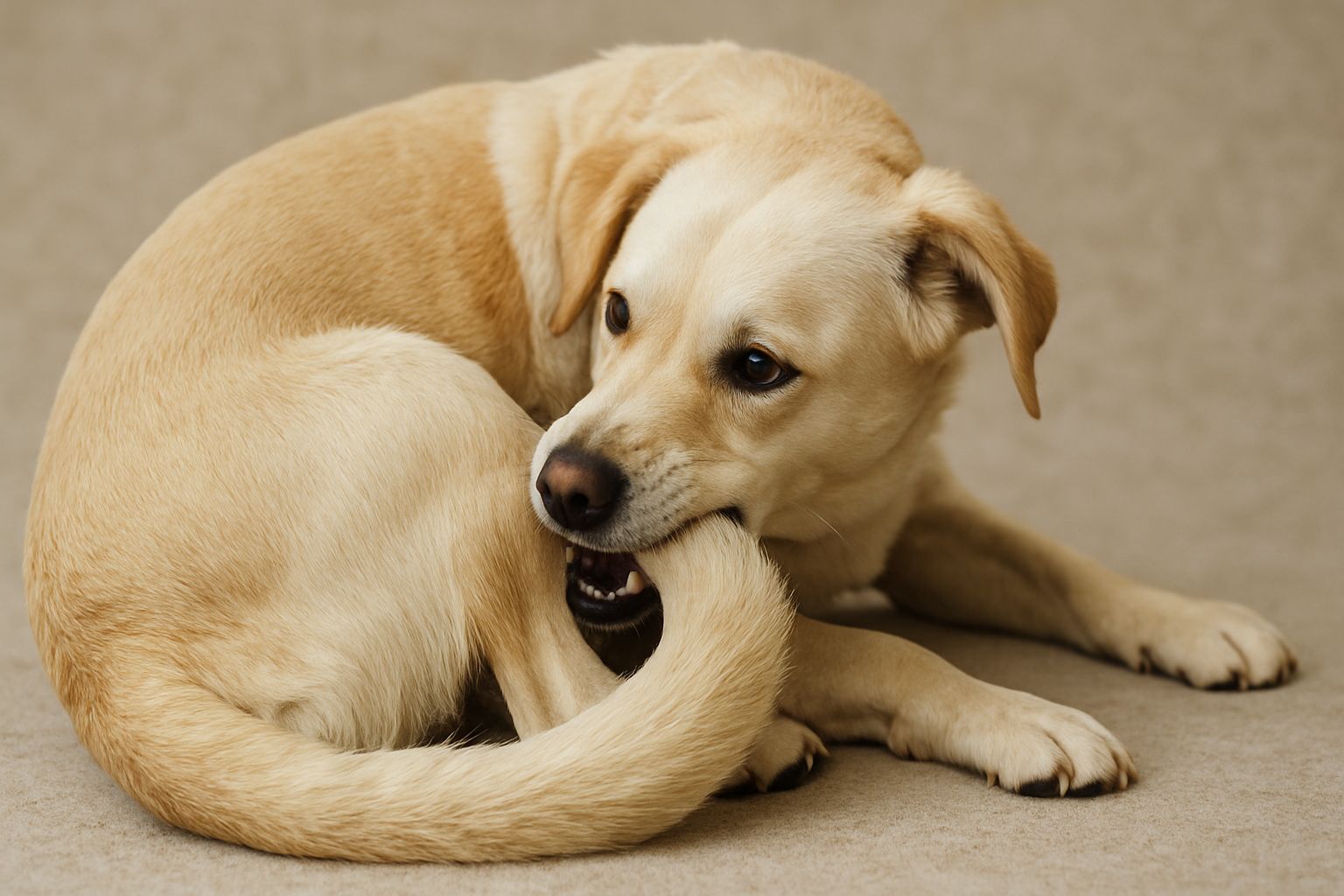- Your Pet's Wellbeing
- Posts
- Why Is Your Dog Biting His Tail?
Why Is Your Dog Biting His Tail?
What to Look Out For
If your dog is chewing or biting his tail, this is a very normal occurrence as your dog is trying to extract something from his tail. However, if your dog chews his tail frequently, it can lead to bleeding and infection. There are a few reasons why your dog might have started the biting and the sooner you can figure out the cause, the sooner you can stop the biting.

As always, if the biting seems to be a health related issue, take your dog the veterinarian to evaluate your pup. However, a preliminary evaluation at home could help narrow the reasons why your dog is chewing on his tail.
What Are the Symptoms of Tail Biting in Dogs?
The most obvious sign of tail biting (if you don’t actually see it being done) is the appearance of hair loss or redness at the base of the tail. This is usually a result of the dog biting or chewing on the area excessively. You might see an open sore or even a small wound small which is an indication that your dog has been biting his tail too aggressively.
Your dog might be chasing his tail for the same reason.
If you see any of the above symptoms, it’s important to schedule an appointment with your vet. However, before you do so, you can evaluate some of the most common reasons that your dog is chewing his tail.
Allergies Or A Skin Condition
If your dog has never been interested in his tail before, it could be an allergy or skin-related issue. Did you make any changes to your dog’s diet? Anything different in your home that might cause a skin ailment? Pollen, grasses and chemicals are just a few of the causes of common skin allergies in dogs. You should keep an eye out for possible wounds, swelling, crusts, bleeding, odor or pus in the tail area.
Fleas, Tick or Other Parasites
Fleas and ticks are common are another reason your dog is biting his tail. We’ve all seen a dog scratch at a spot on his body where fleas are bouncing around or a tick has attached itself. Fleas tend to congregate on the tail, especially near the underside, causing sudden itchy fits.
Tapeworms may cause anal itching that makes your dog bite the base of his tail to get relief. Occasionally, other pesky parasites may cause bouts of intense tail biting in dogs.
Anal Gland Issues
If your dog is biting the base of his tail and the nearby area, anal glands may be the root of the problem. If you think this is the case, it’s important to go see your vet who can take a closer look. One clear sign that a dog is having an anal gland issue is scooting when he sits up and drags his butt across the ground. Other symptoms include a fouler-than-normal smell around your dog’s anal glands which is sort of a fishy smell.
Hot Spots
A hot spot is an area on your dog’s body where repeated scratching or chewing leads to the creation of an open wound. When it’s warm or there is a lot of moisture in the air, these are the optimal conditions for hot spots to form. You can tell if it is a hot spot if an area is bloody, pussy or your dog’s hair is matted. Apple cider vinegar is great, natural cure for a hot spot.
Poor Hygiene
If your dog has poor hygiene due a health issue or irregular grooming, it can make your dog’s rear are become itchy. The hair around your dog’s butt can get matted and even have fecal matter attached. This can cause irritation in your dog’s skin, and it can even become infected. Regular grooming and cleaning can help prevent this from occurring.
Pain Or Injury
Some dogs suffering from hip pain or some other skeletal or spinal abnormality show their pain through on-going tail biting. The intensity of the dog’s pain may lead your pup to act on or draw attention to it by excessive chewing, biting, or licking at the affected area. Only veterinary X-rays will be able to properly diagnose such an issue.
Stress, Anxiety And Boredom
Stress, anxiety, and boredom can lead dogs into many destructive and repetitive behaviors: tearing up your favorite shoes, grabbing food for the trash can and sometimes a dog will try to amuse himself by biting or chasing his tail. If your dog is not getting enough exercise, playing or mental stimulation, your dog might turn to tail biting as ways to get attention. The obvious remedy is to increase the walking and make sure your dog is tired and not gnawing at his tail.
If you think the issue is behavioral, when your dog starts to bite his tail, redirect your pup’s behavior. You can use a command, like “Leave It” and give your dog a toy or treat as a reward.
How To Prevent Your Dog From Tail Biting
Make sure that your dog is on a monthly flea and tick medication to help prevent external parasites.
Regular deworming can also help prevent internal parasites. For adult dogs, deworming should occur twice a year. For puppies, the usual requirement is 4 times in the first 3 months of your puppies life.
If your dog is scooting, a high fiber diet can make our dog’s stool harder. This is especially important if you think this is an issue with your dog’s anal glands. No more scooting and no more biting!
Regular grooming can help your dog stay clean as well as keep your eye out for anything unusual in your dog’s fur.